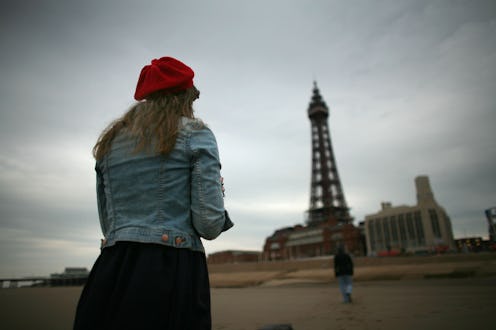News
France Is Considering Making Its Age Of Consent Just 13 Years Old

Over the past few weeks, a barrage of sexual harassment allegations against powerful figures in America have come to light, sparking discussion about consent and responsibility beyond U.S. borders. After a widely criticized rape case in France, a law is now being considered that would set a minimum age of legal consent. But just what that age will be remains up for debate — in an interview on Monday, the justice minister suggested the age of consent in France should be 13 years old.
Although there are currently French laws in place that forbid sexual acts of "violence, coercion, threat, or surprise" toward minors under 15 years old, there is not a minimum legal age of consent in the country. Recently, a number of incidents have prompted French officials and human rights groups to call for reform. The most notable of such incidents was the acquittal of a man who had been charged with raping an 11-year-old girl. The man was 22 at the time, and defended himself in the trial by saying that the young girl had lied about her age, and flirted with him, according to Le Monde.
Just what that minimum age of consent will be, though, is still up for debate. In an interview with French radio station RTL on Monday, Justice Minister Nicole Belloubet agreed that she wanted to institute a minimum age of consent, and noted that the age of 13 could be a good option. Marlène Schiappa, who is the minister of state in charge of gender equality, echoed Belloubet's suggestion in an interview with French television station BFMTV. She said that should an age be established, it would figure somewhere "between 13 and 15 years."
In the United States, where Roy Moore's alleged sexual advances toward women as young as 14 have risen eyebrows, a minimum age of 13 still seems quite young (Moore has called the allegations "completely false and misleading"). But in another interview with RTL, held back in October, Schiappa stressed that it was important to focus on the victims of sexual violence themselves, saying that "it is never their fault," no matter their age.
Despite these politicians' positions, the matter remains contentious among human rights and feminist activists in the country. In a tweet, tech entrepreneur Stephanie Lamy wrote that the discussion proves "just how patriarchal France really is." The story has also been making waves in the United States. Fox News analyst Emily Compagno also expressed shock at the discussion.
In a New York Times op-ed published back in October, journalist Valentine Faure considered the complexity of the situation, and the blurriness of French law when it comes to consent. Faure is writing a book about Jacqueline Sauvage, who was convicted, and later pardoned, of killing her husband, who had abused her for years.
In 2005, the Cour de Cassation, France's highest criminal court, stipulated that coercion is presumed for children at a "very young age." That's an outrageously blurry formulation that in practice has largely been applied to children under 6. This leaves children above 6 potentially considered not raped when violence cannot be established. It also allows the state of paralyzed shock experienced by many victims — and all the more so children — to equal consent.
Faure, for one, wrote that the aforementioned trial should serve as "a moral wake-up call for France." And some suggest there's hope because the country has a long history of pioneering feminist movements. Most recently, many individuals have spoken up about harassment using the hashtag #BalanceTonPorc ("expose your pig"), France's answer to #MeToo.
Just how far the government will go to institute a consent law for minors, though, still remains to be seen.